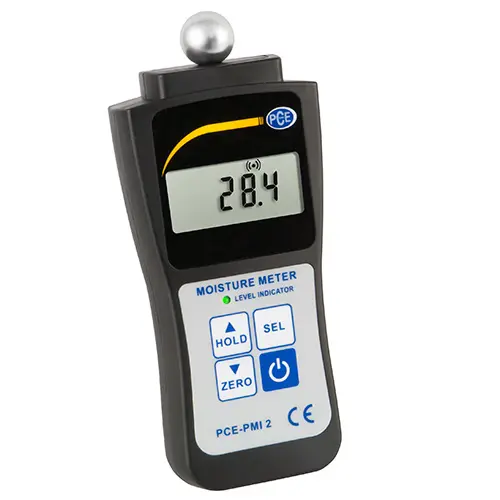Recognizing the Various Types of Moisture Meters and Their Applications
Recognizing the Various Types of Moisture Meters and Their Applications
Blog Article
The Ultimate Guide to Dampness Meters: A Comprehensive Summary and Exactly How They Can Save You Cash
Dampness meters serve as essential devices in identifying and monitoring moisture material in products, assisting in protecting against pricey problems and ensuring the quality of items. Comprehending the nuances of various types of moisture meters, their applications, and the possible cost-saving benefits they provide can be a game-changer for experts and organizations alike.
Kinds of Moisture Meters
Numerous kinds of moisture meters are available for various applications in numerous sectors. One usual kind is the pin-type moisture meter, which gauges the electric resistance between 2 pins inserted into a product. This kind is ideal for wood, drywall, and various other structure products. Pinless wetness meters, on the other hand, usage electromagnetic sensor plates to scan a larger area without triggering damage to the material's surface. Moisture Meter. These meters are ideal for rapidly examining moisture degrees in big areas such as wall surfaces and floors.

Additionally, there are also specialized wetness meters developed for certain products like grain, hay, or soil. These meters provide precise wetness analyses customized to the distinct residential properties of the product being examined. Infrared dampness meters gauge the thermal residential or commercial properties of a material to determine its moisture content non-invasively, making them helpful for applications where pin or pinless meters might not appropriate. Understanding the various kinds of wetness meters available can help industries select the most suitable device for their details dampness measurement demands.

Advantages of Utilizing Moisture Meters
Wetness meters provide indispensable advantages in properly monitoring and examining wetness degrees in varied products and settings. One of the primary benefits of utilizing moisture meters is the avoidance of possible damage caused by excess dampness.
Additionally, making use of dampness meters can cause raised energy performance. By identifying areas with high dampness degrees, such as leaks or bad insulation, modifications can be made to enhance energy preservation and minimize utility expenses. In agricultural settings, wetness meters play a critical function in maximizing plant yields by enabling farmers to monitor dirt dampness degrees and make notified irrigation choices. On the whole, the advantages of using dampness meters span across different markets, supplying cost-efficient remedies and promoting better top quality control methods.
How to Pick the Right Moisture Meter
Selecting the appropriate moisture meter entails taking into consideration crucial aspects such as material compatibility, dimension variety, and calibration precision. When selecting a moisture meter, it's vital to guarantee that the meter appropriates for the details material you will be screening. Various materials have varying electrical residential properties that can influence wetness readings, so selecting a meter designed for your material is essential for accurate results. Furthermore, take into consideration the measurement array of the wetness meter. Make sure that the meter can find dampness degrees within the array needed for your applications. Calibration accuracy is one more Homepage crucial aspect to bear in mind. Select a wetness meter with reputable calibration to guarantee accurate and constant readings. Some meters may call for routine calibration modifications, so recognizing the calibration procedure is necessary. By meticulously reviewing these aspects, you can choose a dampness meter that fulfills your requirements and offers precise moisture measurements for your tasks.
Proper Strategies for Moisture Meter Use

Expense Savings Via Moisture Meter Applications
How can the critical application of dampness meters lead to considerable cost savings throughout different industries? In the farming industry, dampness meters help in establishing the optimal time for gathering crops, stopping excess or over-drying wetness that can affect the last product's high quality.
Likewise, in construction, dampness meters help protect against costly damages by spotting moisture levels in structure materials, such as wood or concrete, which can lead to structural issues otherwise resolved without delay. By identifying issue areas early on, professionals can take restorative actions go now to prevent comprehensive fixings or replacements, inevitably saving time and cash.
Moreover, in the food handling market, moisture meters are important for keeping track of product high quality and ensuring conformity with safety policies. By accurately determining moisture web content in food items, manufacturers can avoid perishing, maintain freshness, and minimize waste, leading to considerable cost savings. Generally, the calculated application of dampness meters is an important investment that can bring about substantial cost decreases and enhanced efficiency throughout different industries.
Verdict
To conclude, wetness meters are important tools for measuring and spotting moisture degrees in numerous materials. By using the best moisture meter and complying with appropriate techniques, users can effectively stop costly problems brought on by excess dampness. Purchasing a top quality dampness meter can lead to substantial expense financial savings in the future by determining prospective issues at an early look at this website stage and enabling prompt remediation. Inevitably, moisture meters are necessary tools for maintaining the honesty and long life of structures and materials.
Wetness meters serve as important tools in identifying and keeping an eye on moisture content in products, aiding in protecting against pricey problems and guaranteeing the quality of products. Infrared wetness meters measure the thermal buildings of a product to determine its moisture material non-invasively, making them helpful for applications where pin or pinless meters may not be ideal.Dampness meters offer indispensable advantages in properly assessing and monitoring dampness degrees in varied materials and environments. In agricultural settings, dampness meters play an important function in enhancing crop returns by enabling farmers to monitor soil dampness degrees and make notified watering choices.In conclusion, wetness meters are valuable devices for determining and finding dampness degrees in different products.
Report this page